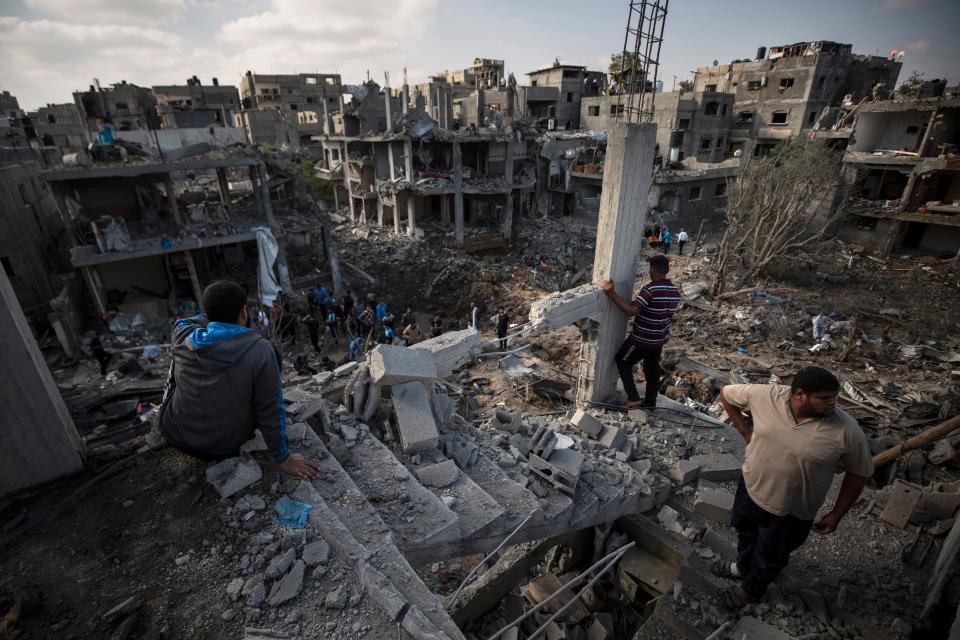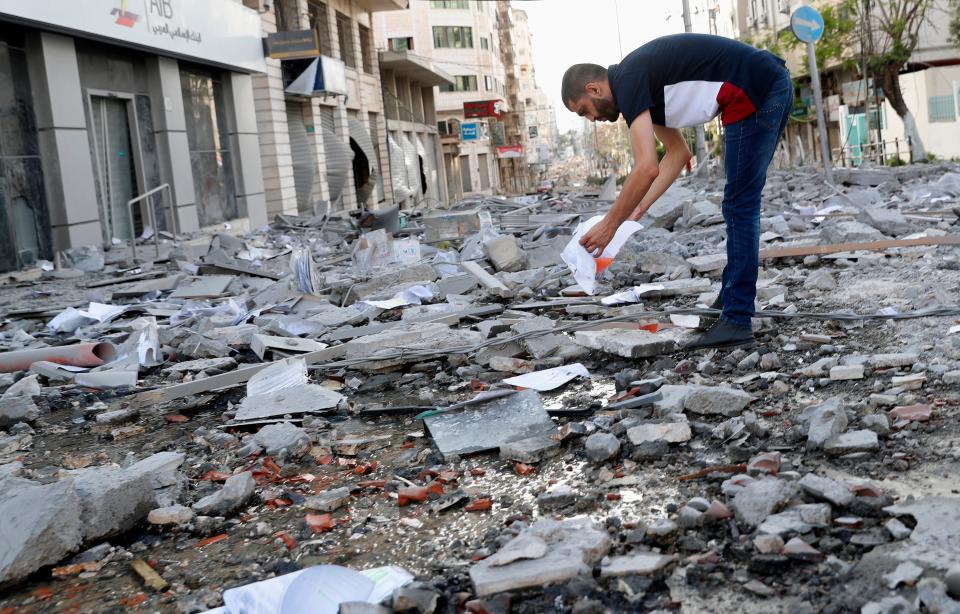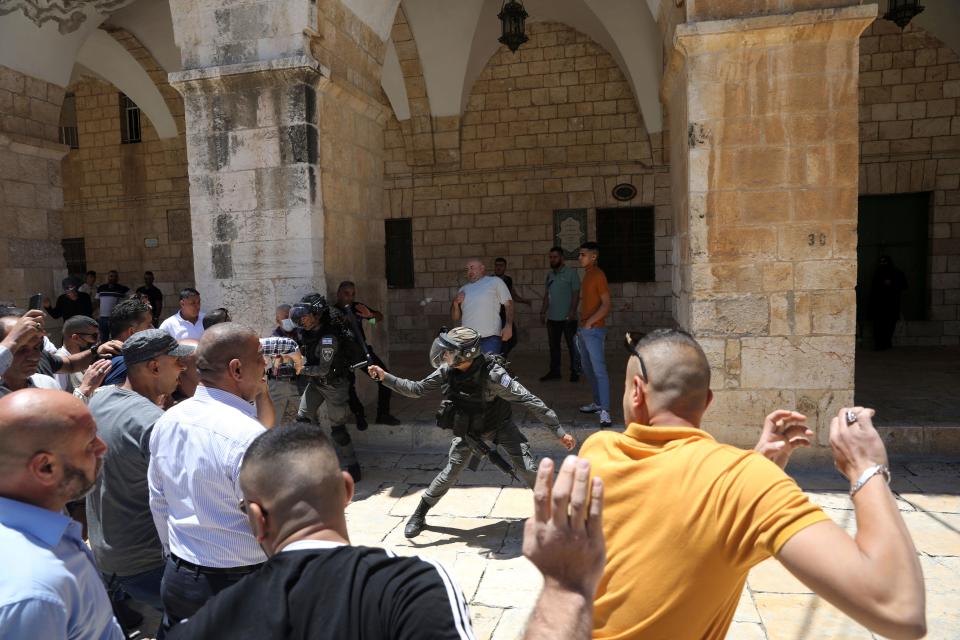Casualty of Israeli-Hamas fighting: The Palestinian two-state solution?
- Oops!Something went wrong.Please try again later.
WASHINGTON – With the Israel-Hamas cease-fire now in place, Palestinians and Israelis are grappling with the grim toll – in lives lost, homes and hospitals destroyed, societal and individual psyches shattered.
But experts say one major casualty has already emerged from the rubble: the two-state solution – the creation of an independent Palestinian nation alongside Israel – which has been the North Star of a negotiated settlement to the decades-old conflict.
It was already a damaged, neglected proposal. The latest violence, which has wreaked far more devastation in Gaza than in Israel, has only highlighted its irrelevance, many former negotiators and Middle East observers believe.
"It is the best option out there, but it may no longer be possible," said Joost Hiltermann, an expert on the Middle East with the International Crisis Group, a conflict prevention organization.
The best-case scenario now, some believe, is a stalemate and return to the status quo. The worst-case scenario: a one-state solution in which Israelis continue to expand their settlements and control all the levels of power while the Palestinians are increasingly marginalized, politically and economically.
Some Palestinians believe one state could be a good outcome – if they are given full citizenship, including voting rights, and all the other benefits enjoyed by Israelis. But few believe Israeli Prime Minister Benjamin Netanyahu or other Israeli leaders would countenance that scenario.
"That is unlikely in extreme," Hiltermann said. "The other possibility is that it becomes ... an apartheid situation, which some people say exists already today, but would then be formalized."
Marwan Muasher, a former Jordanian foreign minister, addressed the question Wednesday at a forum hosted by the Carnegie Endowment for International Peace.
"We are already in a one-state reality," he said. "The question is becoming increasingly: Is this reality going to turn into an apartheid state or a democratic state?"
He and others involved in previous peace talks say today's dynamics do not bode well: emboldened extremists on both sides; dysfunctional and bankrupt leadership in Israel and the Palestinian territories; and the absence of sustained U.S. engagement pushing the two sides toward peace.
"There's a need to reenergize something, because otherwise we are deteriorating in a slippery slope, without noticing, to one state," Tzipi Livini, a onetime vice prime minister of Israel who led peace negotiations in 2008 and 2013, said at the Carnegie forum. "And this is something we cannot afford."

Civilians dug from the rubble
For Israeli and Palestinian civilians whose lives were upended by the 11-day conflict, the most urgent questions are not one-state versus two.
"We are traumatized, and it seems as if all our hopes, ambitions and dreams are over," said Hesham Al-Tabbaa, 40, a Palestinian who lived with his family in Al-Jala Tower, which the Israelis destroyed last weekend amid assertions it was being used by Hamas, the militant Islamic group that controls Gaza.
Osama Abu Safar, 38, of Gaza City said he would welcome a one-state solution if it meant Palestinians could have more stability and freedom of movement. "We could build a port and an airport," he said.
At least 230 Palestinians were killed, including 65 children, and 1,620 people wounded, according to the Gaza Health Ministry, which does not break the numbers down into fighters and civilians. An estimated 58,000 Palestinians fled their homes.
Who's who: Key players in the Israel-Palestinian conflict
The fighting also inflicted fresh damage on Gaza’s infrastructure, already weakened by a 14-year blockade.. Medical supplies, water and fuel for electricity were running low in the territory amid the Israeli and Egyptian blockade imposed after Hamas seized power in 2007.

Israeli attacks damaged at least 18 hospitals and clinics and destroyed one health facility, the World Health Organization said.
In Israel, 12 people, including a 5-year-old boy, a 16-year-old girl and a soldier, were killed.
Arielle Barokas, 25, of Tel Aviv said she has been living in fear for days as Hamas fired thousands of rockets toward Israel and she and her neighbors hunker in their homes or in nearby bomb shelters.
"Every noise triggers me," she said last week, before the cease-fire took hold. "I’m so afraid of leaving my apartment that I’m not going to work right now."
With civilians still being dug out of the rubble, "I don't think anyone is in the mood to talk about trying to understand the other side," Khaled Elgindy, a senior fellow at the Middle East Institute, told USA TODAY in an Editorial Board forum last week.
Indeed, the military confrontation even led to violent street clashes between Arabs and Jews, a raw demonstration that the tensions are unlikely to subside anytime soon. In one incident, a mob of Jewish nationalists attacked an Arab motorist, dragged him from his car and beat him until he was motionless.
"We are facing the risk that the conflict could turn into a religious conflict," Livini said.
'This is what the death of the two-state solution looks like'
This conflict was different from previous military confrontations between Israel and Hamas, according to Tamara Cofman Wittes, a senior fellow at the Brookings Institution's Center for Middle East Policy.
"It is something new," a broader "unraveling" that has its roots in the failed leadership on both sides, Wittes wrote in a blog post.
On the Israeli side sits Netanyahu, the country's longest-serving prime minister and a hard-charging hawk who has pursued an aggressive settlement policy allowing Jews to build thousands of homes in the West Bank and other Palestinian enclaves.
More than 475,000 Jewish settlers now live in the West Bank, and more than 200,000 settlers live in East Jerusalem, according to U.S. and Israel government data. Israel captured the West Bank and East Jerusalem in the 1967 war, and the Palestinians want both as part of their future state. The Palestinians, backed by much of the international community, view the settlements as illegal.
"Those who now keep clinging to the old paradigm of two states have to explain to us how separation of the two communities is going to take place when 700,000 settlers exist in East Jerusalem and in the West Bank," Muasher said.

Hiltermann says that while Netanyahu claims to supports a two-state solution, his policies would not result in a real Palestinian state. "It would be a Palestinian state-minus ... with less land and less authority" than the Palestinians would ever accept, he said.
Last year, Netanyahu vowed to annex large swaths of the West Bank, and though he eventually backed off, he has continued to push policies that squeeze the Palestinians into ever-shrinking enclaves.
Wittes, who was deputy assistant secretary of state for Near Eastern affairs in the Obama administration, says the West Bank annexation threat was the "precipitating event" for this month's conflict.
"This is what the death of the two-state solution looks like," she wrote.

'No unified leadership'
The military clash began on May 10, when Hamas launched long-range rockets toward Jerusalem after days of clashes between Palestinian protesters and Israeli police.
The conflict has allowed Hamas to capitalize on political disarray and disappointment in the West Bank after Palestinian President Mahmoud Abbas canceled legislative elections. Abbas initially cut a deal with Hamas to give the group political representation in the West Bank but then feared his party would lose the elections entirely.
Palestinians have been craving "a refreshment and renewal of their leadership," Hiltermann said, and Abbas dealt a blow to those hopes with his decision to cancel the elections.
"There is no (peace) strategy on the Palestinian side ... because there's no unified leadership," Hiltermann said.
Wittes says the "bankruptcy of political leadership on both sides is another reason why this crisis is so much worse, and so much more widespread, than previous episodes."
'Every incendiary ingredient imaginable': Here's what sparked worst Mideast violence since 2014
The leadership vacuum "extends to the United States as the chief sponsor of the peace process," Elgindy said.
He and other experts say that under President Donald Trump, the United States openly encouraged Netanyahu's expansionist settlement policies and exacerbated the marginalization of Palestinians. President Joe Biden has not brought much improvement, critics contend.
Elgindy said Biden gave Israel a green light to respond to Hamas' attacks even as its missile strikes caused scores of civilian casualties. At the same time, the U.S. stymied a United Nations resolution calling for an end to the violence, frustrating the broader international community.
"That is simply reckless and irresponsible," he said. "That's literally the opposite of what a mediator and peacemaker does."

From friendly to frosty, Biden and Netanyahu's decadeslong relationship tested by current crisis
Muasher said Biden has signaled zero interest in taking up America's traditional role as the primary driver of peace talks.
"It is clear that the Biden administration is not interested in a vision beyond the cease-fire," he said.
The Biden administration insists it is deeply committed to seeking a broader peace.
"We continue to believe strongly that the best path forward for Israel, for the Palestinians, is through two states," Secretary of State Antony Blinken said last week. "That is the best way to guarantee Israel’s future as a Jewish and democratic state and the best way, of course, to guarantee that the Palestinians have the state that they’re entitled to."
Hiltermann said he believes the Biden administration eventually will begin working more actively toward a two-state solution "because they fear what (a one-state solution) might look like."
Aaron David Miller, who helped shape U.S. Middle East policy across multiple administrations, said the U.S. is "caught between the two-state solution that is impossible to implement now" and at the same time "too important to abandon."
Contributing: Akram Elloh and Jotam Confino for USA TODAY; The Associated Press
This article originally appeared on USA TODAY: Israel-Palestine two-state solution out of reach, experts fear

